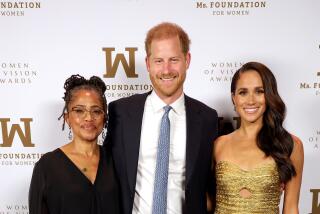Editors at 5 Tabloids Agree to Stay Away From Funeral
- Share via
LONDON — The editors of Britain’s five mass-market tabloid newspapers have sheepishly accepted a demand by Princess Diana’s brother, Charles Spencer, that they stay away from her funeral today even though they had earlier been invited by the royal family.
“We are obviously accepting his request,” said a spokesman for Piers Morgan, editor of the Daily Mirror. Stuart Higgins, editor of the Sun, said he had been “surprised and honored” by his invitation but was “happy to comply” with the request to stay away “as a mark of respect to the princess.”
Spencer’s angry phone calls Thursday to the bosses of Britain’s “gutter press” focused attention again on the mass-market tabloids’ use of snatched pictures of celebrities such as Diana, killed last weekend with two others in a car crash in Paris apparently while trying to escape paparazzi on motorbikes.
They also emphasized a rift between the Spencer family, who want the funeral to be as private as possible, and the royal family, who want to offer the nation a public memorial.
“I think it is appropriate for him to say that he doesn’t want the tabloids there. They have a lot to answer for,” said Labor Party Member of Parliament Clive Soley. “I have been very struck ever since her death that neither the editors nor the owners have put their heads above the parapet--particularly the owners, who, if they had acted together, could have stopped this.”
Indeed, the usually brash tabloid bosses have kept a low profile since the princess’ death. Editors are refusing interviews and shunning publicity and will not discuss their future policy on using paparazzi pictures.
There was strong public anger against the press early this week. Reporters and photographers were repeatedly insulted in the street by people mourning Diana. One nervous tabloid, the Daily Mail, admitted in an editorial that it had “not always been innocent” when it came to recycling “the kind of pictures that jackals with cameras jostle to provide.”
“Diana, forgive the media for what was done to you,” read one of the hundreds of thousands of emotional messages, attached to bunches of flowers, that have been strewn around key London sites by her admirers. “They knew not what they did.”
The accused have been fighting back by trying, with some success, to deflect blame away from themselves and onto the driver of Diana’s car, who died in the crash with what French police said was an illegal blood-alcohol level.
They have also showered the royals with criticism, alleging that they have been coldly out of touch with their country’s grief.
Inflammatory headlines on these topics helped force the royal family to return early from Balmoral Castle in Scotland, raise an untraditional mourning flag over Buckingham Palace and, in the queen’s case, make a Friday speech to the nation.
But, by withdrawing the tabloid editors’ invitations to the funeral, Spencer drew attention back to accusations he had made earlier that the press had “blood on its hands.”
“I always believed the press would kill her in the end,” he commented Monday from the South African home where he fled to escape intrusive reporting of his own marital problems. “But not even I could imagine that they would take such a direct hand in her death as seems to be the case.”
The photogenic princess’ love-hate relationship with her chroniclers--and tormentors--went on for years.
After her marriage to Prince Charles ended, she began to fight back. Last year, Diana won injunctions banning photographer Martin Stenning from coming within 300 yards of her.
In 1993, she sued Mirror Group Newspapers for publishing photos of her taken with a hidden camera in a London gym.
Despite several years of debate, often centering on the coverage of Diana, Britain has no privacy law, only a system of self-regulation and a Press Complaints Commission.
Public suspicion of the media and of journalists, whether tabloid or not, is intense.
Diana’s death has provoked many demands for privacy legislation, even though the accident happened in France, ironically a country with very strict privacy laws.
A committee of Britain’s Press Complaints Commission plans to meet in the next two weeks to discuss a tough new code to control the use of paparazzi pictures.
“If her death does not mark a turning point in our attitude to the vile excesses of these photo thugs, we should be ashamed of ourselves,” said former Conservative Member of Parliament David Mellor, who lost a ministerial job when the tabloids published sensationalized details of an extramarital affair.
More to Read
Sign up for Essential California
The most important California stories and recommendations in your inbox every morning.
You may occasionally receive promotional content from the Los Angeles Times.













